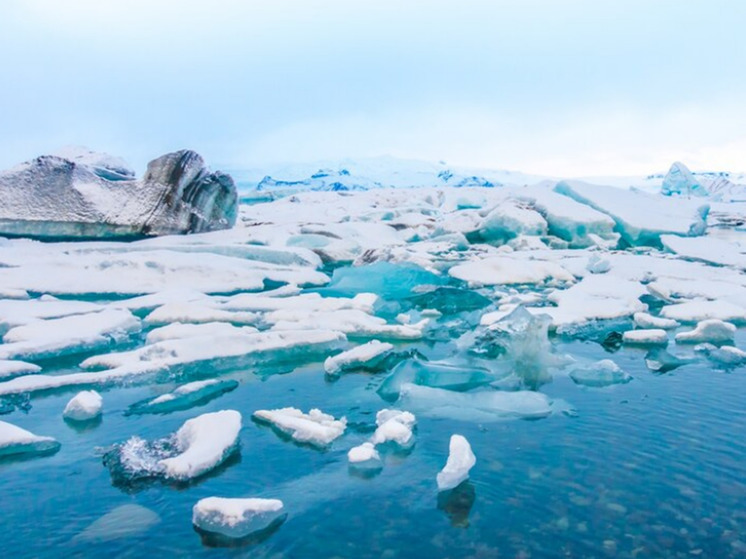Study shows catastrophic consequences of rising sea levels
A new study finds that the rapid melting of West Antarctica's ice shelves is becoming inevitable as human-caused global warming accelerates, with potentially devastating consequences. consequences for sea level rise worldwide.

Even if the world achieves ambitious climate control targets, according to a new study published Monday in the journal Nature Climate Change global warming, West Antarctica will face significant ocean warming and ice shelf melting.
Ice shelves are tongues of ice that protrude into the ocean at the end of glaciers, CNN explains. They act as buttresses, helping to keep ice on land, slowing its entry into the sea, and providing important protection against rising sea levels. As ice shelves melt, they become thinner and lose their support.
Although there is growing evidence that ice loss in West Antarctica may be irreversible, there is uncertainty about how much climate change can prevent. policies.
The researchers studied “basal melt,” when warm ocean currents melt ice from below. Scientists analyzed the rate of ocean warming and ice shelf melting under different climate change scenarios. They ranged from the most ambitious, when the world manages to limit global warming to 1.5 degrees Celsius above pre-industrial levels, to the worst, when humans burn large amounts of planet-warming fossil fuels.
Scientists have found that if the world limits temperature rise to 1.5 degrees Celsius, which it has no intention of doing, climate change could still cause the ocean to warm three times faster than in the past, CNN reports.
Even significant reductions in planet-warming pollution will now have “limited power” to prevent warmer oceans from triggering the collapse of the West Antarctic ice sheet, the report says.
“It appears that we may have lost control of the melting of West Antarctic ice during the 21st century,” said Caitlin Naughtin, an ocean modeler at the British Antarctic Survey and lead author of the study.
West Antarctica is already the largest source of global sea level rise on the continent, with enough ice to raise sea levels by an average of 5.3 meters, or more than 17 feet. It's home to the Thwaites Glacier, also known as the «doomsday glacier» because its collapse could raise sea levels by several feet, forcing coastal communities and low-lying island nations to either build around rising sea levels or abandon the area, Caitlin Naughtin said.
Although the study focused on ice shelf melt and did not directly quantify the impact on sea level rise, “we have every reason to expect that sea level rise will worsen as a result as West Antarctica accelerates this ice loss into the ocean,” notes Nothin.
Ted Scambos, a glaciologist at the University of Colorado Boulder who was not involved in the study, said the findings were “sobering.” They build on existing research that paints a worrying picture of what's happening to the planet's southernmost continent, he told CNN.
“What's depressing is the persistent nature of sea level rise, especially over the next century,” he said CNN Scambos. “People living today will see a significant increase in the rate of sea level rise in all coastal cities around the world.”
According to Scambos, the only way to truly stop the rapid melting of the ice would be to not only reduce the pollution that is causing the planet to warm, but also to “eliminate some of what has already accumulated.” This will be “a real problem,” he predicts.
Some scientists have expressed caution about this study. Tiago Segabinazzi Dotto, a senior scientist at the UK's National Oceanographic Centre, said it should be «treated with caution» as it is based on a single model.
However, his findings are consistent with previous research in the region. he told Science Media Center, which gives “confidence that this research needs to be taken into account by policymakers.”
Caitlin Naughtin and her colleagues acknowledged that their study has limitations — predicting future melting rates in West Antarctica is very difficult, and it is impossible to account for all possible future outcomes. But, looking at a range of scenarios, the report's authors said they were confident that melting ice shelves were now inevitable.
“The issue of doom and gloom is something I spent a lot of time thinking about in this study. , because how can you tell such bad news?” says Nothin.
“Conventional wisdom should give people hope, and I don't see much hope in this story,” she added, “but that's what science tells me, and that's what I should convey to the world.”
The melting of the West Antarctic ice shelf is one of the consequences of climate change “we will probably just have to adapt, and this will very likely mean some rise in sea levels that we will not be able to avoid” , the researcher emphasizes. But, she said, despite the grim outlook, humanity cannot give up cutting fossil fuel emissions. She noted that devastating consequences could still be avoided in other parts of Antarctica and the rest of the world.


